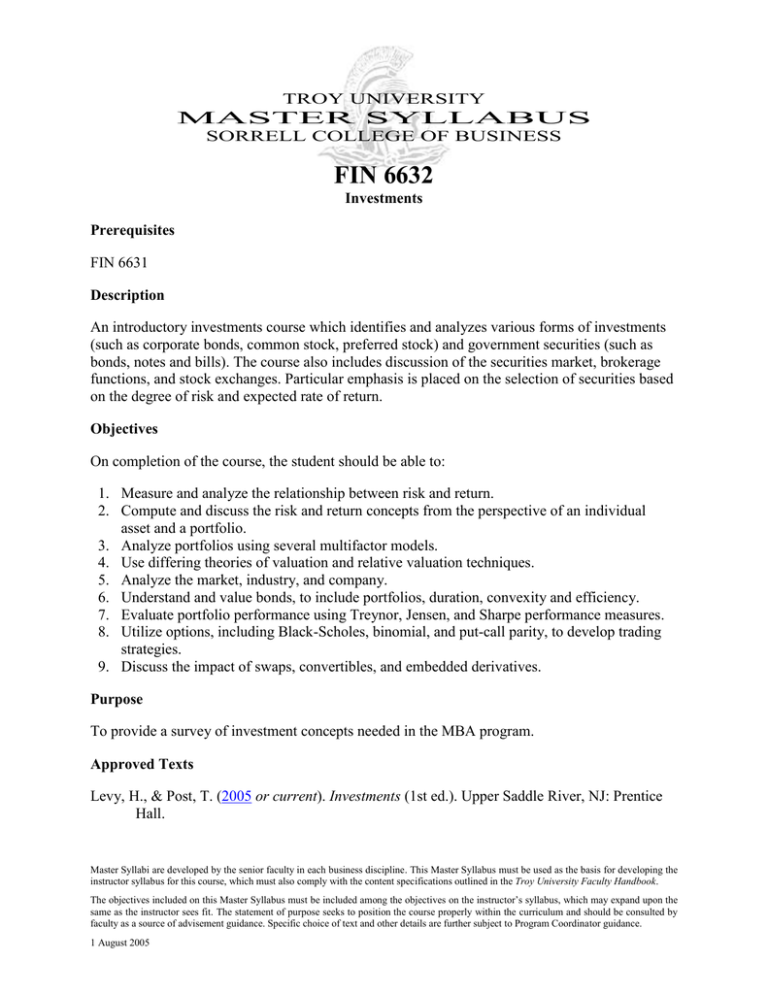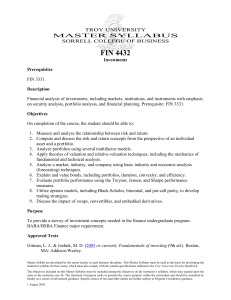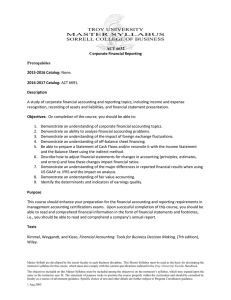FIN 6632 MASTER SYLLABUS
advertisement

TROY UNIVERSITY MASTER SYLLABUS SORRELL COLLEGE OF BUSINESS FIN 6632 Investments Prerequisites FIN 6631 Description An introductory investments course which identifies and analyzes various forms of investments (such as corporate bonds, common stock, preferred stock) and government securities (such as bonds, notes and bills). The course also includes discussion of the securities market, brokerage functions, and stock exchanges. Particular emphasis is placed on the selection of securities based on the degree of risk and expected rate of return. Objectives On completion of the course, the student should be able to: 1. Measure and analyze the relationship between risk and return. 2. Compute and discuss the risk and return concepts from the perspective of an individual asset and a portfolio. 3. Analyze portfolios using several multifactor models. 4. Use differing theories of valuation and relative valuation techniques. 5. Analyze the market, industry, and company. 6. Understand and value bonds, to include portfolios, duration, convexity and efficiency. 7. Evaluate portfolio performance using Treynor, Jensen, and Sharpe performance measures. 8. Utilize options, including Black-Scholes, binomial, and put-call parity, to develop trading strategies. 9. Discuss the impact of swaps, convertibles, and embedded derivatives. Purpose To provide a survey of investment concepts needed in the MBA program. Approved Texts Levy, H., & Post, T. (2005 or current). Investments (1st ed.). Upper Saddle River, NJ: Prentice Hall. Master Syllabi are developed by the senior faculty in each business discipline. This Master Syllabus must be used as the basis for developing the instructor syllabus for this course, which must also comply with the content specifications outlined in the Troy University Faculty Handbook. The objectives included on this Master Syllabus must be included among the objectives on the instructor’s syllabus, which may expand upon the same as the instructor sees fit. The statement of purpose seeks to position the course properly within the curriculum and should be consulted by faculty as a source of advisement guidance. Specific choice of text and other details are further subject to Program Coordinator guidance. 1 August 2005 Master Syllabus: FIN 6632 2 Mayo, H.B. (2010 or current). Investments: An introduction (10th Ed.). Mason, OH: Cengage Learning. Reilly, F. K., & Brown, K. C. (2006 or current). Investment analysis and portfolio management (8th ed.). Mason, OH: Thomson/South-Western. Supplements Singal, V. (2003). Beyond the random walk: A guide to stock market anomalies and low-risk investing. New York: NY: Oxford University Press. Troy University Faculty Handbook (2010): Section 3.9.2.8 [extract] — essential elements of the syllabus (somewhat modified for space): 1. Course title 2. Course number + section 3. Term 4. Instructor 5. Prerequisites 6. Office hours 7. Class days, times 8. Classroom location 9. Office location + e-mail address 10. Office telephone 11. Course description, objectives 12. Text(s) 13. Other materials 14. Grading methods, 16. General supports criterion weights, (computer works, make-up policy, writing center) mid-term grade 17. Daily assignments, reports holidays, add/drop 15. Procedure, course & open dates, dead requirements day, final exam 18. ADA statement 19. Electronic device statement 20. Additional services, statements 21. Absence policy 22. Incomplete-work policy 23. Cheating policy 24. Specialization requirements (certification, licensure, teacher competencies)




